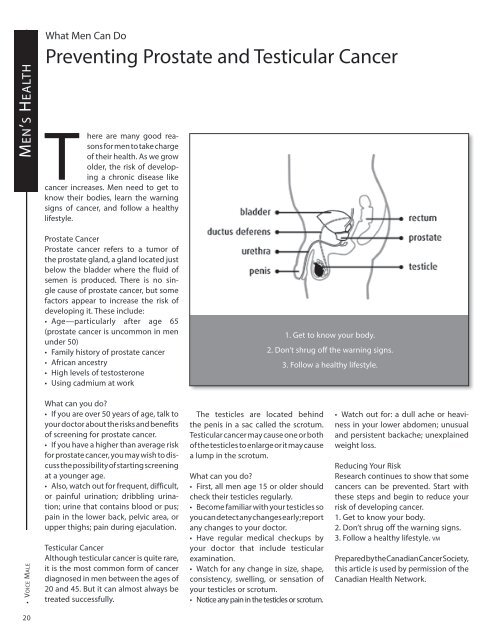to download - Voice Male Magazine
to download - Voice Male Magazine
to download - Voice Male Magazine
You also want an ePaper? Increase the reach of your titles
YUMPU automatically turns print PDFs into web optimized ePapers that Google loves.
• <strong>Voice</strong> <strong>Male</strong> Men’s Health<br />
What Men Can Do<br />
Preventing Prostate and Testicular Cancer<br />
T<br />
here are many good reasons<br />
for men <strong>to</strong> take charge<br />
of their health. As we grow<br />
older, the risk of developing<br />
a chronic disease like<br />
cancer increases. Men need <strong>to</strong> get <strong>to</strong><br />
know their bodies, learn the warning<br />
signs of cancer, and follow a healthy<br />
lifestyle.<br />
Prostate Cancer<br />
Prostate cancer refers <strong>to</strong> a tumor of<br />
the prostate gland, a gland located just<br />
below the bladder where the fluid of<br />
semen is produced. There is no single<br />
cause of prostate cancer, but some<br />
fac<strong>to</strong>rs appear <strong>to</strong> increase the risk of<br />
developing it. These include:<br />
• Age—particularly after age 65<br />
(prostate cancer is uncommon in men<br />
under 50)<br />
• Family his<strong>to</strong>ry of prostate cancer<br />
• African ancestry<br />
• High levels of tes<strong>to</strong>sterone<br />
• Using cadmium at work<br />
What can you do?<br />
• If you are over 50 years of age, talk <strong>to</strong><br />
your doc<strong>to</strong>r about the risks and benefits<br />
of screening for prostate cancer.<br />
• If you have a higher than average risk<br />
for prostate cancer, you may wish <strong>to</strong> discuss<br />
the possibility of starting screening<br />
at a younger age.<br />
• Also, watch out for frequent, difficult,<br />
or painful urination; dribbling urination;<br />
urine that contains blood or pus;<br />
pain in the lower back, pelvic area, or<br />
upper thighs; pain during ejaculation.<br />
Testicular Cancer<br />
Although testicular cancer is quite rare,<br />
it is the most common form of cancer<br />
diagnosed in men between the ages of<br />
20 and 45. But it can almost always be<br />
treated successfully.<br />
The testicles are located behind<br />
the penis in a sac called the scrotum.<br />
Testicular cancer may cause one or both<br />
of the testicles <strong>to</strong> enlarge or it may cause<br />
a lump in the scrotum.<br />
What can you do?<br />
• First, all men age 15 or older should<br />
check their testicles regularly.<br />
• Become familiar with your testicles so<br />
you can detect any changes early; report<br />
any changes <strong>to</strong> your doc<strong>to</strong>r.<br />
• Have regular medical checkups by<br />
your doc<strong>to</strong>r that include testicular<br />
examination.<br />
• Watch for any change in size, shape,<br />
consistency, swelling, or sensation of<br />
your testicles or scrotum.<br />
• Notice any pain in the testicles or scrotum.<br />
1. Get <strong>to</strong> know your body.<br />
2. Don’t shrug off the warning signs.<br />
3. Follow a healthy lifestyle.<br />
• Watch out for: a dull ache or heaviness<br />
in your lower abdomen; unusual<br />
and persistent backache; unexplained<br />
weight loss.<br />
Reducing Your Risk<br />
Research continues <strong>to</strong> show that some<br />
cancers can be prevented. Start with<br />
these steps and begin <strong>to</strong> reduce your<br />
risk of developing cancer.<br />
1. Get <strong>to</strong> know your body.<br />
2. Don’t shrug off the warning signs.<br />
3. Follow a healthy lifestyle. VM<br />
Prepared by the Canadian Cancer Society,<br />
this article is used by permission of the<br />
Canadian Health Network.<br />
20










